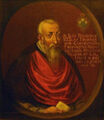Template:Selected anniversaries/November 21: Difference between revisions
No edit summary |
No edit summary |
||
| Line 35: | Line 35: | ||
||1970 – C. V. Raman, Indian physicist and academic, Nobel Prize laureate (b. 1888) | ||1970 – C. V. Raman, Indian physicist and academic, Nobel Prize laureate (b. 1888) | ||
File:Harry Lehmann.jpg|link=Harry Lehmann (nonfiction)|1984: Physicist and crime-fighter [[Harry Lehmann (nonfiction)|Harry Lehmann]] uses a combination of the LSZ reduction formula and the Källén–Lehmann spectral representation to detect and prevent [[crimes against physical constants]]. | |||
||1985 – United States Navy intelligence analyst Jonathan Pollard is arrested for spying after being caught giving Israel classified information on Arab nations. He is subsequently sentenced to life in prison. | ||1985 – United States Navy intelligence analyst Jonathan Pollard is arrested for spying after being caught giving Israel classified information on Arab nations. He is subsequently sentenced to life in prison. | ||
Revision as of 17:55, 21 March 2018
1652: Mathematician, physician, and astronomer Jan Brożek dies. He contributed to a greater knowledge of Nicolaus Copernicus' theories and was his ardent supporter and early prospective biographer.
1675: Isaac Newton publishes new class of Gnomon algorithm functions which detect and prevent crimes against mathematical constants.
1676: Astronomer Ole Rømer presents the first quantitative measurements of the speed of light.
1904: Mechanical engineer Clock Head 2 warns theoretical physicist Albert Einstein that the mass–energy equivalence formula, E = mc², will have "earth-shaking consequences."
1905: Albert Einstein's paper that leads to the mass–energy equivalence formula, E = mc², is published in the journal Annalen der Physik.
1984: Physicist and crime-fighter Harry Lehmann uses a combination of the LSZ reduction formula and the Källén–Lehmann spectral representation to detect and prevent crimes against physical constants.
1996: Theoretical physicist Mohammad Abdus Salam dies. He shared the 1979 Nobel Prize in Physics with Sheldon Glashow and Steven Weinberg for his contribution to the electroweak unification theory.






